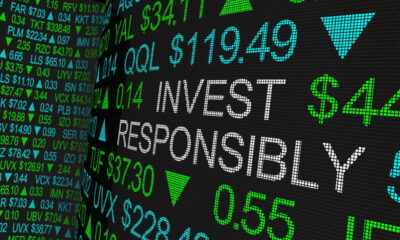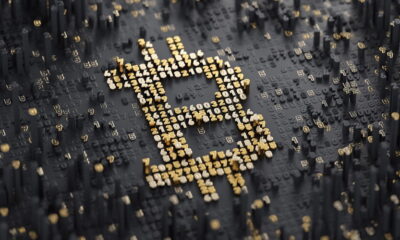

Features
It’s time to pull our heads out the sand, says SWIP fund manager
Craig Bonthron, co-manager of the SWIP Islamic Global Equity Fund, believes that the best way to solve world resource constraints is to invest sustainably. Bonthron describes his fund, which consults sharia law when choosing its investments.
Ethical funds usually have at least one common aspect, insofar as they vet the companies they each invest in. Whilst each fund opts for different investment angles – mostly at the discretion of the fund manager – some funds are governed by a higher power.
Craig Bonthron, co-manager of the SWIP Islamic Global Equity Fund, believes that the best way to solve world resource constraints is to invest sustainably. Bonthron describes his fund, which consults sharia law when choosing its investments.
Ethical funds usually have at least one common aspect, insofar as they vet the companies they each invest in. Whilst each fund opts for different investment angles – mostly at the discretion of the fund manager – some funds are governed by a higher power.
One such vehicle – the Scottish Widows Investment Partnership (SWIP) Islamic Global Equity Fund – uses the teachings of Sharia law to decide which sectors and companies make up its portfolio.
For those unaware of Sharia law, the BBC offers quite a handy definition:
“Sharia law is Islam’s legal system. It is derived from both the Koran, as the word of God, the example of the life of the prophet Muhammad, and fatwas – the rulings of Islamic scholars.
“But Sharia differs in one very important and significant way to the legal traditions of the Western world: it governs, or at least informs, every aspect of the life of a Muslim.”
The SWIP fund styles itself towards this market, and because Sharia law forbids the payment or acceptance of interest, it’s important that its stock selection is carefully chosen.
This isn’t to say, though, that it’s open solely to Muslims.
“Anybody can invest in it”, explains Craig Bonthron, co-manager of the fund with Johnny Russell.
“I guess the naming convention – the fact that it’s called an Islamic fund, which is the specific reason it was set up – may fall off the radar of the normal investor, but it’s very appropriate for a lot of ethical investors because under Sharia law, you’re also excluding tobacco and alcohol, and so it becomes more like a traditional ethical fund.
“If you were looking at the stocks from the sector breakdown, you might not even notice it wasn’t an ethical fund.”
As one of the longest running Islamic equity strategies available in the UK, having been set up in November 2005, the fund was originally established to give Muslims the chance to hold investments, because Sharia law tends to make it quite difficult to do so.
Within SWIP’s global equity team, there are ten analysts, each responsible for a different global sector. Once a potential company is flagged up, the team points the fund managers in the right direction.
If the company passes the Islamic screening, it’s then up to the managers to decide whether there is an investment opportunity and the board of scholars to decide whether it is appropriate for the fund.
The Islamic Global Equity Fund is benchmarked against the Dow Jones Islamic Index, as well as the MSCI World Index. Catering to the Islamic market’s requirements, companies are selected based on their interest – in order to satisfy sharia law.
“When a stock is included in the Dow Jones Islamic Index, that’s the starting point of whether we can invest in it”, says Bonthron.
“The board of scholars will take a quick look at it and meet, and if it’s in that index, it’s usually a quick decision, but if it’s not, then it would take longer to have a close look at the stock and make sure it fits into the various criteria.
“Pragmatically, there are no stocks that you could invest in that have zero interest income or interest expense. Most companies take on some form of leverage or debt.
“The basic rules are no more than 30% debt-to-equity ratio, and there are limits on the amount of interest income and interest expense that can be generated by the business.”
The fund’s sector weights are significantly different from its benchmark. The energy sector in the Dow Jones Islamic Index contributes to about 18%, whilst in the MSCI World Index, it’s more like 12%. The SWIP Islamic Global Equity Fund has about 20% of its stocks in the energy sector.
Healthcare is the same. It makes up 25% of the SWIP fund, but 17% in the Dow Jones Islamic Index, and only 10% in the MSCI World.
Because Sharia law prevents capitalisation on interest, the SWIP fund has zero weight in financial companies, versus the MSCI World, which has about 17% weight.
With these sectors in mind, ultimately, ethical or sustainable investment, says Bonthron, is about solving global concerns.
“There are problems that need to be solved and we can no longer stick our heads in the sand and ignore these issues”, he stresses.
“Resource constraints are becoming clearer and clearer. We need to find alternative sources of energy, we need to find more efficient ways of disposing of our waste, and we need to find more efficient ways of finding water, using it efficiently and returning it to nature in a clean way.
“So there are clearly a lot of resource constraints and demographic issues throughout the world that we need to solve, and one of the best ways of doing that is to invest capital behind it, and allow companies to focus on that and provide solutions.
“This is as much about solutions for us as it is about avoiding bad stuff.”
By opting for vehicles such as the SWIP Islamic Global Equity Fund, your money can start making a positive difference rather than funding unsustainable practices.
For more information on the fund, have a look at the factsheet and visit SWIP’s website.
Alternatively, fill in our online form and we’ll connect you to a specialist ethical adviser who can help you.
Previous fund profiles:
IM WHEB Sustainability Fund
Kames Capital Ethical Equity Fund
Quadris Environmental Forestry Fund
Ludgate Environmental Fund
7IM Sustainable Balance Fund
Allianz RCM Global EcoTrends Fund
Cheviot Climate Assets Fund
Skandia Ethical Fund
Premier Ethical Fund
SVM All Europe SRI Fund


 Environment11 months ago
Environment11 months agoAre Polymer Banknotes: an Eco-Friendly Trend or a Groundswell?

 Features10 months ago
Features10 months agoEco-Friendly Cryptocurrencies: Sustainable Investment Choices

 Features11 months ago
Features11 months agoEco-Friendly Crypto Traders Must Find the Right Exchange

 Energy10 months ago
Energy10 months agoThe Growing Role of Solar Panels in Ireland’s Energy Future





























